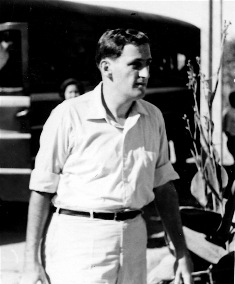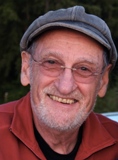Where Were You When John F. Kennedy Was Shot? Al Guskin (Thailand 1962-64) Remembers

Al Guskin in Thailand January 1962
Like everyone else I remember exactly where I was when I heard that Kennedy was assassinated. I was in Bangkok Thailand teaching as a Peace Corps Volunteer in the Faculty of Education at Chulalongkorn University. My former wife Judy, also a PCV teaching at the University, and I were doing some errands and we walked into a Chinese Pharmacy on Phetburi Road, a large thoroughfare about 2 blocks from our house. As we entered the pharmacy the pharmacist came out from behind the counter and was very animated. He didn’t speak English and his Thai was not great. He kept pointing his index finger to his temple (as if it were a gun) and kept repeating the word “shot” in Thai. We couldn’t quite make out what he was saying but it sounded like an important American had been shot. We looked at him trying to figure what he was saying and realized we should go home and find out.
We walked out of the store and walked down the street to our house all the while trying to figure out who might have been shot. I recall that we thought about Kennedy being shot but then we said no that would not be possible. Since there were obviously no cell phones and, in fact, we did not have a phone in our house, when we arrived home we turned on the radio and tried to figure out what happened. As we were trying to listen to the rapid fire broadcast, a graduate student of mine who was living with us came rushing into the house and told us that Kennedy had been killed. He had been at the University studying and rushed home to tell us what had happened.
I don’t remember much of what Dirake said to us but I do vividly remember that Judy and I decided to leave and travel to the Little Home Bakery, a western style cafe, in the part of Bangkok where almost all non PCV Americans in Thailand lived. We immediately went out to the main street and took a motorized samlor (rickshaw) to the cafe. For the first time in our year in Thailand, we wanted to be with other Americans and we knew they would be there. Except for seeing fellow Peace Corps Volunteers when they came into Bangkok, this was the only time in the 27 months in Thailand when we wanted to talk only to Americans.
I do not remember much about what we said or how we felt, but I imagine that we were in a state of shock and probably cried. Like all Peace Corps Volunteers in Thailand we were seen as “Kennedy”s Children.” The Thais loved Kennedy and they saw us as part of his work. And the next weeks proved how true that was. At the Faculty of Education where we taught, students, faculty and others would come up to us and with great sadness offer their condolences for our loss. Wherever we went Thais would stop us and express their sadness at our loss. Volunteers in rural areas later told us that similar things happened to them. Thais wore mourning clothes for days after the assassination. More than any other time in my 24 years I felt like a symbol; it was my responsibility to accept their grief on behalf of the Kennedy family and the US.
Kennedy was so much a part of our lives. We had been deeply involved in responding to Kennedy’s challenge at the University of Michigan on October 14,1960 that many see as the critical moment in the founding of the Peace Corps. Kennedy had asked to meet with us and a few other members of our group after the speech he gave in San Francisco in the last days of the 1960 campaign committing himself to the creation of a Peace Corps. Both Judy and I talked directly with Kennedy on the Toledo, Ohio airport tarmac in the early morning after he flew overnight to Toledo from SF to give a campaign speech. He joked with us and said in answer to a question about how serious he was about his commitment to the creation of the Peace Corps: “Until Tuesday (election day) we’ll worry about this country, after that the world.” There was no press except the Michigan student newspaper; he just wanted to see the students who had responded to his challenge.
And here we were a couple of years later in the Peace Corps on the other side of the world in Thailand facing the reality of his death.
But I don’t believe I fully grieved until I returned home from Thailand in May 1964 and sometimes afterward watched a two hour documentary on the assassination and the funeral. Unlike people in the US I was not able to fully grieve Kennedy”s death by watching the funeral and the all events surrounding it on TV in the few days afterNovember 22. We read newspapers about it but seeing the horse drawn carriage with the coffin and the Kennedy family and world leaders marching to the beat of the drum, John John saluting, Carolyn and her mother touching the flag on the casket–all these vivid images came to life in the documentary two years later and I cried and cried.
For the last 12 years Al Guskin has been a University Professor in Antioch University’s  innovative PhD in Leadership and Change Program where he spends his time supervising dissertations and advising student–whose average age is 45-50 and who are leaders in their professions. He served as President and then Chancellor of Antioch University from 1985-1997. Prior to Antioch his career in higher education included leadership positions as Chancellor, University of Wisconsin-Parkside (1975-1985), Acting President, Clark University in Worcester, Mass. (1973-1974), and Provost, Clark University (1971-1973). He has held faculty positions at the University of Michigan as well as Clark, University of Wisconsin-Parkside and Antioch. Al has written frequently on the role of leadership, power, conflict and change in colleges and universities.
innovative PhD in Leadership and Change Program where he spends his time supervising dissertations and advising student–whose average age is 45-50 and who are leaders in their professions. He served as President and then Chancellor of Antioch University from 1985-1997. Prior to Antioch his career in higher education included leadership positions as Chancellor, University of Wisconsin-Parkside (1975-1985), Acting President, Clark University in Worcester, Mass. (1973-1974), and Provost, Clark University (1971-1973). He has held faculty positions at the University of Michigan as well as Clark, University of Wisconsin-Parkside and Antioch. Al has written frequently on the role of leadership, power, conflict and change in colleges and universities.
After graduating from Brooklyn College in 1958, Al attended the University of Michigan from 1958-1961 and from 1966-1968, receiving a Ph.D. in social psychology. He interrupted his graduate education to serve as a Peace Corps Volunteer in the first group to go to Thailand and then as a senior administrator in the creation of the domestic peace corps, VISTA. While a graduate student in 1960, Al and his former wife Judy organized a student group on the Ann Arbor campus that is widely credited with inspiring John F. Kennedy to establish the Peace Corps.
In a career that spans 40+ years, there are many areas of interest and even expertise, but these days Al is probably best known for his leadership roles in higher education and his recent writings and speaking on the transformation of higher education.
Al lives in the Seattle, Washington area in the small city of Edmonds. He often travels to consult and give speeches and has a home office from which he communicates to the world!
Al Guskin’s remembrance very nicely sums up what perhaps most of us living abroad felt at the time of JFK’s death – that on first hearing of it we felt disbelief, that we wanted to be with other Americans that day, that the real grief came later in retrospect, and “More than any other time… I felt like a symbol; it was my responsibility to accept their grief on behalf of the Kennedy family and the US.” Especially the latter – but, I would add, on behalf of a grieving world…
Thanks, John, for posting these moving bits of memoir. -Don Messerschmidt, Nepal-2, 1963-65.
Wonderful end to an interesting set of posts on the assassination. I’ve often wondered how different history would have been if Guskin had not had the chutzpah to challenge candidate Senator Kennedy.
From what I understand (from Art Zucker), Antioch University has been a wild ride for the past few years. Nothing like Peace Corps service to prepare one for a bracing life in academia. Nice work all around.
Al , I remember meeting you in Indianapolis on 1986. You attended our celebration of the 25th anniversary of the Peace Corps. Now retired from Indiana state government and enjoying life from Mesa AZ. Best wishes and tske care. Bill Powell